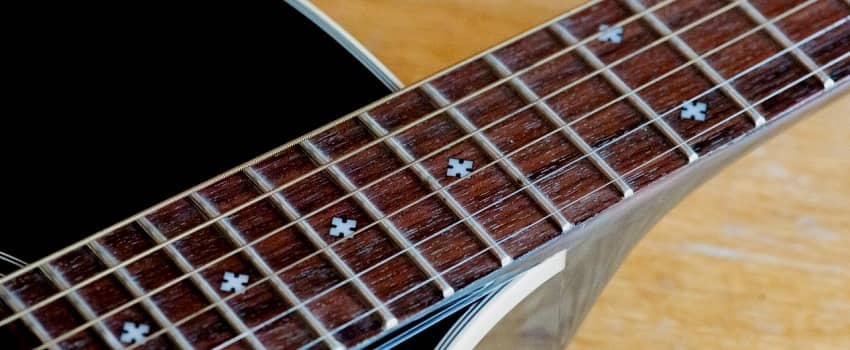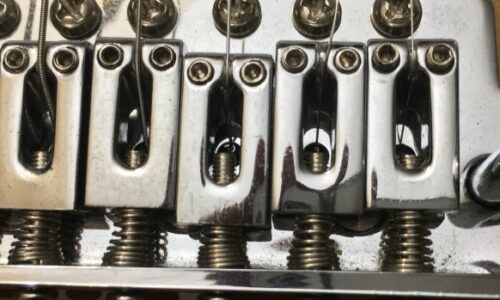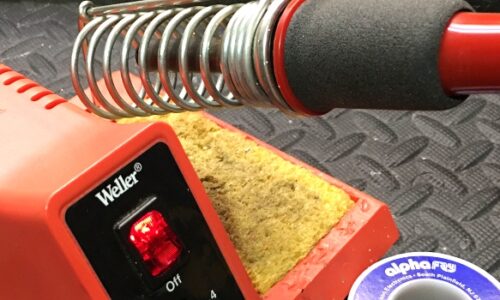Fretboard Conditioner

Best Guitar Fretboard Conditioner
DISCLAIMER Our fretboard conditioner article is offered as general advice based on our experience and online study. Apply the following opinions with due diligence and caution. Due to the many types of paints, stains, and top-coat finishes this article cannot address all possible combinations, risks, or results. Links to third-party information should not be considered an endorsement of any information. We are not an affilliate marketer or otherwise compensated for sales of any product listed here.
What is fretboard wood conditioner?
Fretboard wood conditioner products serve to protect and preserve wood. Much like knife handles and cutting boards, bare wood needs an ocassional cleaning and conditioning. Products made for guitar fretboards are usually thinned out to faciliate easier penetration and absorption.
Most wood cleaning and preservation products have an organic base, using lemon oil, mineral oil, etc. Some wood conditioners have waxes blended into the product formula.
What does fretboard conditioner do?
Products to condition guitar fretboards make it easier to clean an maintain the surface. Additionally, wood treatment products keep the wood supple. This means your fretboard is less prone to cracking and shrinking. Although not a need, the best fretboard conditioners leave the wood with a nice sheen and feel
NOTE: Wood conditioner products are intended for only unfinished dark wood fretboards (i.e., Rosewood, Indian Laurel, Ebony, etc.). Do not use these products on any finished areas (paint, clear coats, satin finishes, etc.) including coated fretboards.
What are the Best Fretboard Conditioners
There are many fretboard oil guitar care products available. Any product from a reputable company will probably do a decent job for you. Don’t be afraid to try several and decide for yourself.
Our picks for best fretboard conditioners
MusicNomad F-One Fretboard Cleaner & Conditioner
- Average Price: $9.00
- Description: 2 oz. bottle with a complex mixture of the finest ultra refined tree and seed oils to clean, condition & protect your fretboard. (No lemon oil, silicone or petroleum distillates.)
- Buy this online at Sweetwater Music
Gerlitz Guitar Honey Fretboard Treatment
- Average Price: $ 9.00
- Description:2 oz. bottle with spray head to clean and protect, providing a soft sheen on any wood fretboard. (No lemon oil)
- Buy this online at Musicians Friend
Taylor Fretboard Conditioner
- Average Price: $10.00
- Description: 2 oz. This special formula solution keeps your fretboard wood clean and optimized for maximum action and response.
- Buy this online at Taylor Guitars
Comments on other products based on ad copy
- Dunlop Formula 65 Fingerboard 01 Cleaner/Prep and 02 Deep Conditioner. A two-part system, two 2oz bottles for $18 that, by comparison, is more difficult to use.
- Doctors Products Fret Doctor Fretboard Conditioner. About 4x the cost of other quality products.
- Ernie Ball Fretboard Conditioner Wonder Wipes. Handy to carry in your guitar case with no rick of spill. Does not provide an easy way to control how much product you use, and creates unnecessary trash.
How to clean and condition a guitar fretboard
When using one of the best guitar fretboard conditioner products you can clean and condition in a single step. Always follow the manufacturers directions. Typically, here are the stpes to clean your guitar fretboard:
- Remove strings. Wipe down the fretboard to remove loose impurities
- Wipe it down with a damp cloth, use a tootbrush across the wood and toothpick to clean along fret edges
- Wipe down the fretboard with a dry paper towel to remove loosened impurities and moisture
- Apply the conditioner and use your fingers to work it into the wood. Pay attention to having conditioner along fret edges.
- After 1-2 minutes and wipe down the full fretboard to remove any standing conditioner.
A best practice is washing your hands after applying conditioner, and before you handle your guitar. This is the best way to avoid getting the product on places it should not be
The experts at Premier Guitar wrote a fantastic article on Safe Ways to Clean Your Guitar’s Finish.
Unfinished wood necks can typically be cleaned safely with a lightly damp cloth which is immediately followed with a dry microfiber towel. Do not let water or other liquids “stand or puddle” on your guitar. Most clear coat finishes can be cleaned in a similar manner.
How often should you use fretboard conditioner?
Applying fretboard conditioner about once a year is a good rule of thumb. The frequency of applying fretboard conditioner depends on your environment the condition of your guitar. If your fretboard looks and feels exceptionally dry it probably could use some hydration nourishment.
NOTE: Cleaning a fretboard and applying wood conditioner should be a standard part of a guitar or bass setup service.
Countering Myths and Faulty Information
- Can you use lemon oil on your guitar? Pure lemon oil contains citric acid which is good for cleaning. Citric acid can be detrimental to adhesive used for a nut, binding, and frets. The guitar assembly website states, “…pure lemon oil should definitely not be used on your guitar fretboard under any circumstances. It is much too strong and can dry the fretboard out over the long-term.”1 Lemon oil products for wood are blended with elements such as olive oil, vinegar, etc. A blended product minimizes the concentration of citrci acid, however; products rarely show the amount of lemon oil in their products.
- Can you use mineral oil on your guitar? Generally speaking, it is safe to use mineral oil on your guitar fretboard for conditioning. A drawback is that pure mineral oil does not facilitate any level of cleaning.
- Can you use culinary oil on your guitar? While it may be tempting to go to your kitchen and grab vegetable oil, peanut oil, coconut oil, or similar cooking oil, don’t do it. Once applied, these oils begin to break-down and can later have foul greasy kitchen smell. Additionally, per the Rock Guitar Universe website, “You must NOT use coconut oil, olive oil, lemon oil or vinegar on your guitar either the strings, fretboard or any other part. all of these products can cause unrecoverable damage to the wood of your guitar because they are acidic.”2
- Can you use household cleaners on your guitar? To answer this question we defer to the smart advice by the experts at Premier Guitar. An excerpt from a recent article states, “No matter what brand or type of cleaner you choose, always avoid those that contain silicone, heavy waxes, lacquer thinner, bleach, etc. Household furniture polish and all-purpose cleaners—such as Pine Sol, Windex, and 409—will also damage your finish.”3
A word of caution from Martin Guitars; Per the Martin Guitars website, “Martin Guitar does not recommend using lemon oil on the fingerboard. The acids in lemon oil break down the finish of your guitar. It may also speed the corrosion of the frets and decrease the life of your strings.”4
Everybody should take care of their gear to maintain optimal playability. Feel free to post a comment with your tips or ideas for another article.
CREDITS and FOOTNOTES
- 1 Craig Bourne, “Lemon oil: Should I use it on my guitar fretboard and what are some good alternatives?”, January 2, 2021, Available from Guitar Assembly
- 2 Staff Writer, “Can I Use (Coconut, Olive, Lemon) Oil, Vinegar On My Guitar”, June 27, 2018, Available from Rock Guitar Universe
- 3 John Levan, “Guitar Shop 101: Safe Ways to Clean Your Guitar’s Finish”, November 29, 2013, Available from Premier Guitar
- 4 Staff Writer, ” Can I use lemon oil on my fingerboard?”, April 20, 2020, Available from C.F. Martin & Co.
- Photo by Dr. Nick Stafford, available at Pixabay




Great info! I showed the article to my tech and he gave it a thumbs up.
All products listed are good in my book. I’ve tried a lot of products but like the Guitar Honey stuff better than the others.